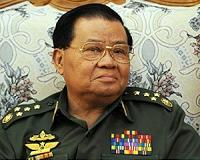| . |  |
. |
Mogadishu, Somalia (UPI) Sep 9, 2010 The suicide bombing at Mogadishu's airport Thursday by Islamist fighters linked to al-Qaida underlined how a 2-week-old insurgent offensive is squeezing the shaky Western-backed government into an ever-shrinking pocket in the capital. The beach-side airport is deep in territory held by the increasingly fragile Transitional Federal Government, which more and more seems to be hanging on only by its fingertips. The infiltration by the forces of al-Shebaab, the main Islamist militia, was a powerful omen that the TFG's days may be numbered, unless African states beef up the African Union peacekeeping force, already strengthened from around 4,000 men to 7,000, deployed in Mogadishu. That force, known as Amisom, is the only thing standing between the TFG and complete disaster. It has mounted counterattacks, largely using artillery and mortars, but al-Shebaab keeps coming. The Somalia Islamists, beefed up in recent months by a significant number of Arab and Pakistani veterans of al-Qaida's war in the east, have widened the Somali conflict by bombings in neighboring Uganda, whose troops are supporting the TFG in Mogadishu. More than 70 people were killed in two bombings in Kampala, Uganda's capital, July 11 as soccer fans watched the World Cup final on television. Those attacks, the first by al-Shebaab outside Somalia, moved its war from a national conflict into the global jihad and delivered a powerful warning to African states to back off aiding the TFG. African participation in Amisom is reluctant at best, so, although there have been promises to beef up the force to 10,000, AU members are likely to think twice about helping the federal government remain in Mogadishu. Al-Shebaab has been pushing closer to the TFG's seat of power for weeks, nibbling off a street here and there in the militia's most concerted effort in 18 months to topple the administration of President Sheikh Sharif, installed in December 2006, and take control of the entire war-battered capital. Al-Shebaab sharply stepped up its operations Aug. 23 against the government, the 14th since clan warlords united to topple dictator Mohammed Siad Barre in 1991 and plunged the country into nearly two decades of anarchy and bloodshed. The next day, a jihadist suicide team, wearing TFG military uniforms, stormed the Hotel Muna, well inside the TFG-held enclave, and killed 31 people, including 15 members of parliament, in a brazen daylight strike before setting off explosives, killing themselves and wrecking the building. At the same time, Islamists seized the strategic thoroughfare known as the Muka al-Mukarama that links key government ministries and the presidential palace with Mogadishu's shell-battered airport. Sheik Ali Mohammed Rage, al-Shebaab's spokesman, declared Aug. 24 that the jihadists were launching a "massive war" against "the invaders." And in the days that followed, that turned out to be no idle threat. The attackers have pushed the TFG and its Ugandan and Burundi Amisom "peacekeepers" into a sliver of the capital comprising a few blocks around the palace, known as the Villa Somalia, the airport and the seaport. Al-Shebaab, and its sometime ally Hizb-ul Islam, a smaller Islamic militia, have taken parts of the Hodan and Wardhiglry districts, pushing what's left of Sharif's beleaguered government, into just a few blocks around Villa Somalia. The TFG's army has essentially disintegrated in recent months. Hundreds of troops, unpaid for months despite infusions of U.S. funds, defected with their weapons. This week there were reports that the commander of the TFG forces, "General" Mohammed Kahiya, was fired after it was found he and other officers had systematically sold on the open market "tons of small arms" provided by the United States since he was appointed 10 months ago. That undoubtedly meant most of those weapons are now in the hands of al-Shebaab, which also holds large chunks of territory in the plains of south and central Somalia. The jihadists, meanwhile, have been seeking to form alliances with other warlords to mount a more effective offensive to unseat the TFG and declare an Islamic state. "Only by forming alliances with other powerful actors would al-Shebaab be able to seriously threaten the TFG, as the balance of power between the two sides has essentially been frozen since al-Shebaab and Hizb-ul Islam's failed attempt to seize the capital in May 2009," said the U.S. global security consultancy Stratfor.
Share This Article With Planet Earth
Related Links The Long War - Doctrine and Application
 Myanmar leader wants better China ties, as polls loom
Myanmar leader wants better China ties, as polls loomBeijing (AFP) Sept 8, 2010 Myanmar's junta leader Than Shwe said Wednesday he wanted to bolster ties with China, his regime's main trade partner and diplomatic ally, two months ahead of polls decried in the West as a sham. Than Shwe, whose regime has drawn international condemnation for its human rights record and political repression, arrived in China Tuesday for a four-day visit that will also include visits to Shan ... read more |
|
| The content herein, unless otherwise known to be public domain, are Copyright 1995-2010 - SpaceDaily. AFP and UPI Wire Stories are copyright Agence France-Presse and United Press International. ESA Portal Reports are copyright European Space Agency. All NASA sourced material is public domain. Additional copyrights may apply in whole or part to other bona fide parties. Advertising does not imply endorsement,agreement or approval of any opinions, statements or information provided by SpaceDaily on any Web page published or hosted by SpaceDaily. Privacy Statement |